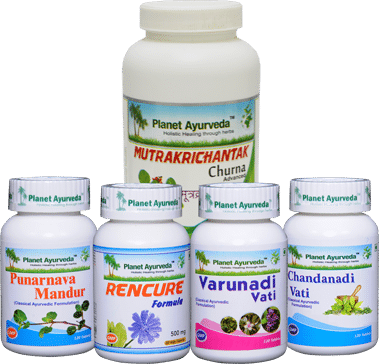Cysts are enclosed sac like structures that contain liquid or semisolid substance. In general, cysts can be present in any part of the body. They are named according to their location in the body; for example cysts on the skin are called sebaceous cysts, whereas those present in the nerve roots and liver are referred to as Tarlov cysts and liver cysts respectively. Likewise, renal cysts are the cysts present in the kidney. It is common to have more than one renal cyst, which in maximum cases, are benign (not dangerous). However, the severity of the symptoms may vary according to the underlying causes of the condition.
Here are two significant categories of kidney cysts that exist. The most common type of kidney cyst is the “simple kidney cyst.” The simple kidney cyst is very common and has no risk of becoming a kidney cancer. The other type of cyst is called a “complex cyst.” The term “complex cyst” refers to a spectrum of cysts that have different characteristics which may make them suspicious for kidney cancer.
A “simple kidney cyst” is a finding that has a very clear definition depending on the radiologic imaging test (e.g. ultrasound, CT scan, etc.) that is used to identify it. The simple kidney cyst is a spherical space somewhere in the kidney that is filled with liquid. Lining or wall of the cyst is very thin and has no irregularities in it. Inside the simple kidney cyst there is nothing but fluid, which when removed is usually yellow or clear. A simple kidney cyst has no risk of becoming a kidney cancer and is therefore nothing to worry about. Indeed, by the time a person is 50 years old, there is a 50% chance that he or she will have a simple cyst. As we get older the chances of having a simple cyst increase and the cysts increase in size as well. If you are over 50 years old and you do not have a simple cyst, you are therefore in the minority of people. Another type of simple kidney cyst is called a hyper dense cyst. A hyper dense cyst is a simple kidney cyst that has blood within the walls of the cyst. A hyper dense kidney cyst is not suspicious for cancer and is just another type of simple kidney cyst.
Usually, simple kidney cysts do not result in any symptoms and cause no harm to the body. On rare occasions, a cyst may cause symptoms such as flank pain, but this is quite unusual. A “complex kidney cyst” is different from a simple kidney cyst as the cyst may be irregular in its outer shape. To be defined as a complex kidney cyst, the cyst must have some type of irregularities inside of it. The irregularities come in different varieties. “Septations” are walls within the cyst. These walls may be very fine and thin or quite thick and coarse. Having many or thick walled Septations may suggest that the cyst is more likely to be associated with a kidney cancer. Cysts may also be “calcified.” This means that the mineral calcium is visualized inside of the cyst. There may be very little calcium, or the calcifications may be quite thick. A complex kidney cyst may also have tissue inside of it that “enhances.” Enhancement means that a part of the complex kidney cyst gets a blood supply, which can be demonstrated by giving contrast material into a vein while radiologic testing is in progress. Solid enhancing material inside of a complex kidney cyst is suspicious for kidney cancer and may require intervention by a Urologist for treatment. Many complex kidney cysts may have a low risk for being or becoming a kidney cancer. However, there is some risk that a complex cyst is a kidney cancer and complex kidney cysts do require evaluation by an experienced Urologist who may consult with a radiologist. Often, complex kidney cysts may be treated with active surveillance to see if the cyst changes in any way over time. The risk that a complex kidney cyst is, or may become, cancer depends on its appearance.
Herbal Remedies for Renal Cysts by Planet Ayurveda
Ayurvedic point of view it balances the imbalance of the three energies which are responsible to run a body.
Planet Ayurveda offers the best combination of effective herbal remedies such as Revive Kidneys Pack for ayurvedic treatment of renal cysts. These herbal remedies are prepared from using best quality herbs and strictly follow the principles of Ayurveda. All these herbal remedies of Planet Ayurveda are 100 percent pure, natural and vegetarian. These are free from chemicals, additives and preservatives. These are safe to use as these are free from side effects.
Dosage
- Varunadi Vati – 2 Tablets, thrice daily with warm water after meals.
- Mutrakrichantak Churna – 1 Teaspoonful twice daily warm with water and for best result Boil 1 Teaspoonful in 400ml water until it remains 50-60ml. Filter the preparation with a regular tea strainer and drink. You should use this once in morning 45min. after breakfast and similarly in evening 45min. after dinner. Prepare fresh every time as per this.
- Rencure Formula – 2 Capsules, twice daily with warm water after meals.
- Punarnava Mandur – 2 Tablets, thrice daily with warm water after meals.
- Chandanadi Vati – 2 Tablets, twice daily with warm water after meals.
The above given pack will shrink the size of cyst with days and in months the cyst will be removed. It will also treat the reasons responsible for the development of cyst. Revive kidney pack will manage overall kidney function and also balance the tridoshas Vata, Pitta and Kapha.
All the products can be taken together, along with the ongoing dialysis and other medications.
To buy Revive Kidneys Pack, please visit store.planetayurveda.com/products/revive-kidneys-pack

